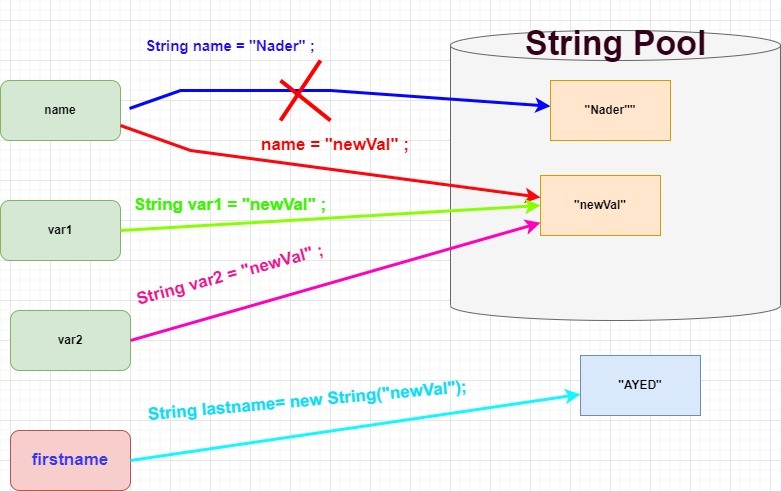Discovering the Advantages of Unalterable Strings in Modern Programming Paradigms
In the world of modern-day shows paradigms, the idea of immutable strings stands as a foundation of robust software application growth. The advantages they use exceed plain benefit; they basically alter the method information is dealt with within applications. By adopting immutable strings, designers can ensure boosted data stability, boosted string safety and security, streamlined debugging processes, enhanced protection steps, and effective efficiency optimization. These advantages work as a testimony to the profound impact that welcoming immutability can carry the dependability and performance of software program systems.
Boosted Information Integrity

By protecting against the modification of string things, immutability eliminates the risk of unintended changes to the information they hold. This not only enhances the security of the info but additionally improves the reliability of the code that depends on these strings.
Immutability likewise supports much safer multithreading settings, as concurrent accessibility to unalterable strings does not position the risk of information corruption through simultaneous alterations. This home streamlines the procedure of taking care of strings in parallel programs situations.
Basically, immutability functions as a safety shield around the data saved within strings, boosting their integrity by guaranteeing that when specified, their worths stay unchanged throughout the program's execution.

Improved String Security
Unalterable strings boost the string security of programs by making certain that as soon as a string item is produced, its worth can not be customized. This residential property eliminates the risk of simultaneous strings attempting to customize the same string concurrently, which could lead to data corruption or inconsistent states in the program - Why are strings immutable in Java?. In a multi-threaded setting, where several strings gain access to and adjust data concurrently, the immutability of strings provides a degree of safety by guaranteeing that the information remains unmodified throughout its lifecycle
Simplified Debugging Procedures
Provided the enhanced string safety and security facilitated by unalterable strings, a significant advantage occurs in the world of streamlined debugging procedures. Unalterable strings, as soon as produced, can not be modified, making it much easier to trace the circulation of data and identify the resource of insects in a program. This immutability makes certain that strings continue to be constant throughout the execution of the program, minimizing the chance of unexpected changes that might result in mistakes.
When debugging with mutable strings, designers often come across issues where a string's value is modified unintentionally, making it challenging to determine the origin of a bug. However, with unalterable strings, the data stays unmodified, enabling programmers to focus on examining the actual logic of the code instead than locating where and when a string was modified improperly.
In addition, immutable strings simplify the debugging procedure by allowing much easier reproduction of bugs. Considering that immutable strings do not transform state, designers can recreate and research bugs better, bring about quicker identification and resolution of problems within the codebase. This streamlined debugging operations ultimately contributes to greater software program top quality and boosted total development effectiveness.

Enhanced Safety Steps
Enhancing data protection and fortifying system honesty, the use of unalterable strings in software applications contributes significantly to raised safety and security measures. Immutable strings, when created, can not be customized, giving an essential defense against destructive tampering or unapproved gain access to. By making certain that sensitive data saved in strings remains unaltered throughout the program's execution, the danger of data violations or injection assaults is significantly lowered. Why are strings immutable in Java?. Immutable strings likewise play an important duty in preventing common protection susceptabilities such as buffer overflows and SQL injection strikes, as attempts to adjust string information at runtime are naturally limited.
Furthermore, the immutability of strings boosts the predictability of program click here now behavior, making it simpler to validate inputs and stop unexpected adjustments that might compromise safety. This predictability streamlines the procedure of auditing and confirming code, making it possible for designers to identify prospective protection technicalities better. Generally, including unalterable strings into software program growth techniques not only improves the robustness and dependability of applications however likewise enhances their resilience against security dangers.
Reliable Performance Optimization
When dealing with mutable strings, operations like concatenation or substring creation click reference usually result in the production of brand-new string things, leading to memory expenses and raised processing time. By permitting strings to stay continuous and unchangeable, unalterable strings help with much better memory administration and caching chances, ultimately boosting the overall performance of the software application.
Given that immutable strings can not be customized once produced, they can be shared across strings without the danger of unexpected modifications, lowering the requirement for synchronization devices and enhancing concurrency. Unalterable strings streamline debugging processes as programmers can trust that a string's value will stay consistent throughout the program's execution, removing prospective errors created by mutable state modifications.
Final Thought
In conclusion, the advantages of utilizing immutable strings in contemporary programming standards can not be overstated. Enhanced data stability, boosted thread safety, streamlined debugging processes, increased security procedures, and efficient performance optimization all add to the total performance of programming jobs. By integrating immutable strings into programs techniques, programmers can profit from a more robust and trustworthy codebase.
Immutability, a key attribute of strings in programs languages such as Java and Python, makes sure that as soon as a string item is created, it can not be changed or changed.Unalterable strings boost the string safety and security browse around this site of programs by ensuring that as soon as a string things is developed, its value can not be changed. Unalterable strings also play a vital role in preventing usual security vulnerabilities such as buffer overflows and SQL injection attacks, as efforts to manipulate string information at runtime are naturally limited.
By allowing strings to continue to be stable and consistent, immutable strings help with far better memory administration and caching opportunities, ultimately increasing the total efficiency of the software application.
Immutable strings streamline debugging procedures as programmers can rely on that a string's worth will stay consistent throughout the program's execution, removing possible errors created by mutable state modifications.